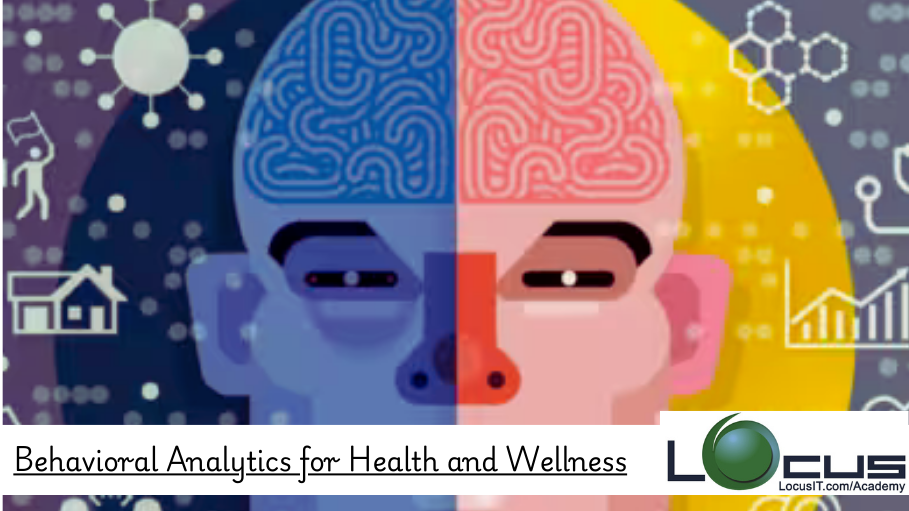Description
Introduction
Behavioral analytics for health and wellness refers to the use of data analysis techniques to understand and predict human behavior in relation to health-related activities, lifestyle choices, and wellness outcomes. By analyzing behavioral data, healthcare providers, wellness programs, and organizations can gain valuable insights into the habits, routines, and factors that influence an individual’s physical and mental health. These insights help in personalizing health interventions, designing targeted wellness programs, and improving overall health outcomes. Behavioral analytics also plays a key role in identifying patterns that may lead to disease prevention, enhanced treatment plans, and improved healthcare strategies.
Prerequisites
Participants should have:
- A basic understanding of health and wellness concepts, including physical and mental health.
- Familiarity with behavioral science, health psychology, and lifestyle medicine.
- Experience with data collection methods, including surveys, wearables, and health tracking tools.
- Knowledge of statistical analysis and interpretation of health-related data.
- Basic familiarity with analytics tools and platforms used in healthcare settings (e.g., Excel, R, Python).
Table of Contents
- Introduction
1.1 Overview of Behavioral Analytics and Its Importance in Health
1.2 How Behavioral Analytics Enhances Wellness Programs
1.3 Benefits of Behavioral Insights in Health Interventions - Understanding Behavioral Factors in Health and Wellness
2.1 Key Behavioral Determinants of Health
2.2 Psychological and Environmental Influences on Health Choices
2.3 The Role of Habits and Routines in Health Outcomes
2.4 Motivation and Behavioral Change in Wellness - Data Collection Methods
3.1 Types of Data Collected
3.2 Using Wearables and Mobile Apps for Tracking Health Behavior
3.3 Surveys, Interviews, and Self-Reporting Tools
3.4 Challenges in Behavioral Data Collection and Ethical Considerations - Analyzing Health Behavior Data
4.1 Techniques for Analyzing Behavioral Health Data
4.2 Statistical Methods for Health Behavior Analysis
4.3 Using Machine Learning and AI in Behavioral Health Analytics
4.4 Data Visualization Tools for Presenting Health Insights - Predicting Health Outcomes with Behavioral Analytics
5.1 Understanding Health Behavior Models and Predictive Analytics
5.2 Identifying Patterns and Trends in Health Data
5.3 Predicting Chronic Disease Risks Based on Behavior
5.4 Case Study: Predicting Weight Loss and Fitness Success - Behavioral Insights in Disease Prevention
6.1 Using Behavioral Analytics for Preventative Health Strategies
6.2 Designing Lifestyle Intervention Programs(Ref: Psychological and Behavioral Analysis for HR and Recruitment)
6.3 Tracking Behavioral Changes in Chronic Disease Management
6.4 Case Study: Preventing Cardiovascular Disease through Behavioral Data - Improving Mental Health with Behavioral Analytics
7.1 Analyzing Behavioral Data for Mental Health Interventions
7.2 Identifying Behavioral Indicators of Mental Health Issues
7.3 Personalized Mental Health Care Based on Behavioral Analytics
7.4 Case Study: Addressing Depression and Anxiety through Data-Driven Solutions - Personalized Health and Wellness Plans
8.1 Creating Tailored Health Plans Using Behavioral Insights
8.2 Integrating Behavioral Data with Clinical Health Data
8.3 Designing Personalized Wellness Programs Based on Behavior
8.4 Case Study: Personalized Fitness and Nutrition Plans - Improving Engagement in Health and Wellness Programs
9.1 Understanding Barriers to Engagement in Health Programs
9.2 Using Behavioral Analytics to Improve Program Adherence
9.3 Enhancing User Experience with Data-Driven Health Interventions
9.4 Case Study: Boosting Employee Wellness Program Participation - Behavioral Analytics in Health Marketing and Consumer Behavior
10.1 Using Behavioral Insights for Targeted Health Marketing
10.2 Behavioral Segmentation for Health and Wellness Products
10.3 Understanding Consumer Health Behavior and Decision-Making
10.4 Case Study: Marketing Wellness Apps Using Behavioral Data - Ethical Considerations in Behavioral Analytics for Health and Wellness
11.1 Privacy and Confidentiality of Health Data
11.2 Ethical Use of Behavioral Data in Health Interventions
11.3 Addressing Bias and Discrimination in Behavioral Health Analytics
11.4 Ensuring Transparency and Consent in Data Collection - Future Trends in Behavioral Analytics for Health and Wellness
12.1 The Role of AI and Big Data in Future Health Analytics
12.2 Advancements in Predictive Health Modeling
12.3 Behavioral Analytics in the Era of Personalized Medicine
12.4 The Future of Wellness Programs Powered by Data - Conclusion
13.1 Key Takeaways from Behavioral Analytics in Health and Wellness
13.2 The Impact of Data-Driven Insights on Health and Wellness Outcomes
13.3 Future Directions for Behavioral Analytics in Health
Conclusion
This course is providing valuable insights into individuals’ health-related behaviors and motivations. By utilizing this data, healthcare providers and wellness programs can create personalized, data-driven interventions that promote healthier lifestyles, prevent diseases, and improve overall wellness outcomes. As technology continues to advance, behavioral analytics will remain a crucial tool for shaping the future of health and wellness programs, empowering individuals to make informed decisions about their health and encouraging sustained behavior change.







Reviews
There are no reviews yet.